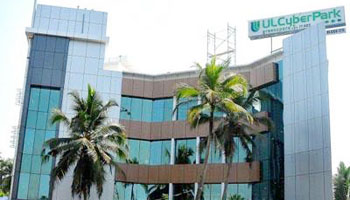By Balu Aiyer
The sprawling UL Cyber Park was the venue of the two-day workshop (August 18 and 19) on Collective Entrepreneurship in India. Representatives from cooperatives, academia, and development agencies gathered to understand and evaluate the status of co-operatives under industrial, artisanal and service-provider co-operatives; share expert knowledge on ‘social co-operatives’ in India and other countries; and learn about workers’ owned or managed co-operatives.
The landmark cyber park (10 floors, 482,000 sq ft building) built by the Uralungal Labour Contract Co Operative Society (ULCCS) is a testament to the opportunities a worker cooperative could aspire for and achieve through member focus, steely determination and emphasis on growth in business and diversification.
The workshop was organized by the International Co-operative Alliance Asia and Pacific (ICA-AP), National Co-operative Union of India (NCUI), National Labor Co-operative Federation of India (NLCF), and the ULCCS.
Support was also provided through the European Commission, “Co-operatives in Development – People-Centered Businesses in Action,” grant to ICA. Mr. Shaju S, Managing Director of ULCCS in his welcome remarks spoke of ULCCS efforts to position itself in the coming years through diversification in their business while adhering to their core principles.
Dr. Thomas Issac, Minister of Finance, Government of Kerala in speech laid emphasis on the need to create an alternative to the market that continues to perpetuate inequality and an unsustainable environment. He stressed that co-operatives were an important component of the new architecture. Mr. Hyungsik Eum from CICOPA (ICA’s sectoral organization on industrial and service co-operatives, Brussels.) provided an overview of the sector internationally; while Ms. Shyama S., National Project Coordinator, ILO- Sri Lanka spoke about the fundamental principles and rights at work.
Prashant Nair, District Collector Kozhikode stressed on the need to promote cooperatives as it laid more emphasis on WE rather than I. Ms. Vasudha Mishra, Managing Director of the National Cooperative Development Corporation spoke about the role of the Government in encouraging collective entrepreneurship. Mr. Ashok Dabas speaking on the state of workers’ cooperatives in India emphasized on the need for government to create a more enabling environment. Mr. Satyanarayana, CEO of NCUI spoke of the need for more emphasis on training and skill development of workers.
Among the organizations in attendance were Action Aid, Artisans Kudumbha Suraksha Padhathi, Aulakh Krishi Nivesh Processing Vipnan Sahakari Samvida Samiti Ltd., Bramhagiri Society, District Cooperative Hospital – Kozhikode, EMS Memorial Hospital, Institute of Co-operative Management Kannur, Indian Institute of Management – Kozhikode, Indian Labor Cooperative Society, Jataula Cooperative Labour & Construction Society Ltd., Kamadhenu Sahakari Shram Samvida Samiti Ltd., Kerala State Labor Cooperative Federation, NM Sadguru Foundation, SWACH Pune, and the ULCCS
India is a central part of the global trend of rapid urbanization, with more than 31 percent of the country’s 1.2 billion people living in urban areas — a figure that is set to rise significantly in coming years. In cities, the informal and self-employed play a major role in driving the economy but suffer from lack of legal recognition, poor enforcement and …. Studies have shown that cooperatives achieve economic, social and environmental objectives as they integrate marginalized people into the labor market – which coincide with government policy; undertake important activities which are not worthwhile for mainstream businesses to provide; offer higher quality and more responsive services, because of the greater involvement of individual users; and fulfill an important function in society by helping to repair the loss of ‘social capital’. There is however the need for an enabling environment and these include: legal recognition; preferential public procurement; consortia which assist social co-operatives; and availability of finance on good terms.
A study will be carried out on the status of work industrial, artisanal and service-provider co-operatives in India and presented at a workshop during the ICA-AP Regional Assembly in New Delhi in November. The workshop will discuss issues at a Asia Pacific level and explore the formation of CICOPA – Asia and Pacific, similar to the ones in the Americas and Europe.
